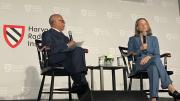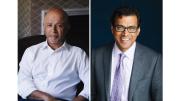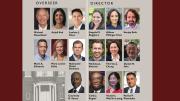As part of the celebrations for Harvard Law School's (HLS) capital campaign (see separate post on President Drew Faust's remarks, and the HLS news release), panelists discussed "Corporate Leadership in a Time of Turmoil" in the Ames Courtroom of Austin Hall on the afternoon of October 23. (As one sign of that continuing turmoil, scheduled panelist Brackett B. Denniston III, J.D. ’73, had to cancel on short notice; two other invitees—Securities and Exchange Commission chairman Christopher Cox, M.B.A. ’76, J.D. ’77, and Congressman Barney Frank ’61, J.D. ’77—remained involved in pressing business elsewhere.)
Scott professor of law Robert C. Clark, the school's immediate past dean and a leading scholar of corporate law, said the panel's topic had evolved from an emphasis on leadership toward greater focus on turmoil as the financial crisis unfolded during the past several weeks.
Panelist Frank E. Dangeard, LL.M. ’85—formerly with the S.G. Warburg investment bank, and then a CEO who was brought in successively to turn around three nearly bankrupt government-owned or -controlled enterprises in France (most recently Thomson S.A., from which he stepped down earlier this year), said the current crisis reflected crises of leadership. He cited three issues. The first was the "systematic short-sightedness that we have all shown in the last three or four years." From 2003 on, he said, it was clear that a credit crisis was building: stocks were trading at "crazy multiples" (of earnings), there was "no due diligence" (presumably of loan conditions or in acquisitions)—and "nothing was done about it." By 2007, he said, it was evident that financial companies' balance sheets would have to shrink, implying a tightening of credit and the inevitable recession that is now becoming apparent. The failure to detect and act on these developments was a failure of leadership.
Second, he said, was the "black sheep problem." Anyone who perceived the excesses of the past five years and spoke out about them faced being either ignored or ostracized (in the press, by the investment markets, or, indeed, by their own boards of directors). As a result, too many chose not to speak out.
Finally, he saw a clear "breakdown in our checks and balances." In the interplay of financial businesses, industrial businesses, and government regulators, Dangeard said, any one sector left to its own devices will inevitably go too far. From his perspective in industrial management, he said, the balance had swung far too much toward the financial side "because short-term financial goals have become the way companies have to be run." Directors and outside investors—in hedge funds, for instance—press managements to take short-term actions to boost stock prices, even when those measures are inconsistent with companies' long-term health and strategic plans. "A lot of industrial company boards have become like trading floors," he said, with excessive focus on breaking up companies into component parts or undertaking other financial-engineering measures in the hope of securing short-term gains in market valuation.
At the same time, he was cautious about suddenly trying to invent an entirely new world financial system to replace the Bretton Woods regime, yet wary that nothing at all would be done. "Everybody running a company knows that quarterly [earnings] disclosure is complete nonsense," Dangeard said, "but are we prepared to change it?" He was doubtful, given offsetting claims for greater transparency and disclosure. On the other hand, would it really make sense to ban the short-selling of stocks permanently (as the United States did temporarily for financial stocks, during the moment of maximum market turmoil)? Efficient reform would require thoughtful leadership from among the ranks of HLS faculty members and graduates.
Lazard chairman and CEO Bruce Wasserstein, J.D. ’70, M.B.A. ’71—among the most prominent global advisers on mergers and acquisitions, and therefore, he acknowledged, one of those people who "break up and put together companies"—said the times behooved the panelists and others to be "somewhat modest" about what qualifies as leaderliness. People in leadership positions had proved, too often, not to be leaders; it was worth noting that the past five years of heady earnings produced by the securities industry and its leaders had all been reduced to zero from the write-downs of recent months. Whatever lists of leadership characteristics one might generate, he said, the two central traits were integrity and "judgment, or common sense"—not least in picking members of a management team with skills complementing one's own. HLS excelled at "inculcating that kind of thinking," Wasserstein said—“and a little bit of thinking goes a long way, especially on Wall Street."
As he surveyed the financial industry, Wasserstein said, even though every major firm that has recently failed, or come close to failing, employed hundreds of Ph.D.s who were responsible for controlling risk, the firms proceeded to make loans to non-creditworthy customers; to securitize those loans (injecting some of their own capital and selling off the rest to others); and to place an optimistic value on their own burgeoning portfolios of such assets. In so doing, they took on enormous financial risk, building asset portfolios 30 times their equity capital, and assuming credit risk from the underlying loans.
When the inevitable collapse set in, the institutions tried to stave it off by delaying selling the troubled assets or writing their value down to market levels, on the false assumption—built into the risk models—that "real estate prices must go up" inevitably: a universal delusion. The firms' own leaders had failed, he said. Government leaders and the Federal Reserve Board failed because they did not step in to limit the firms' leverage or risk profiles. And rating agencies' leaders had failed, too. "The lesson in our little industry is that what's apparent leadership may not be real leadership," Wasserstein said, "and you may not know that for many years." A look back at those purported leaders' press clippings would find uniformly positive notices about their performance, reflecting aggressive public relations.
In his own firm, Wasserstein said, the biggest challenge was "looking around corners" to try to discern mega-trends (changes in the economy, in industries, in countries, and in technology) and mega-risks (where it paid to ask, "Where can this go wrong?"). In this sense, the financial firms' risk models—which assumed normal business cycles, but not situations where you could "fall off a cliff," destroy the enterprise, and never recover—had failed utterly. "The business-school analysis of risk is useless," he added, because it is too short term and too narrow. (Business historian Niall Ferguson made the same point in his scathing critique at Harvard Business School's centennial gathering on October 13; video.) As an example, Wasserstein said, hedge funds may have focused on their investment performance, and fared well—but ignored the fact that if their prime broker, such as Lehman Brothers, failed, "all your money is all tied up…and you're out of business." A wave of such failures is under way, or imminent, he said.
"Leadership," Wasserstein concluded, "is looking to the future, but paying very close attention to the present—and just using a little bit of common sense."
In the ensuing discussion, panelists were asked about the bankruptcy of Lehman Brothers and the adequacy of the federal government's response to date. Wasserstein said certain things, in hindsight, could have been done better, but he was largely sympathetic to the actions that had been taken—particularly the recent focus on recapitalizing banks rather than earlier efforts to buy their toxic assets. In general, he said, "There was an interconnectivity of the system without any circuit breakers, and it was belatedly understood."
Clark asked whether there were any good suggestions about how to improve, reform, and restructure the financial system in the future: to date, he had not seen any "compelling, thoughtful, evidence-based ideas that are likely to have any" good effects.
Dangeard said the current situation was analogous to having a patient in intensive care: once survival is assured, the search for changes in accounting, governance, and disclosure can begin.
Wasserstein warned against reaching for "easy, phony solutions." Lashing out at corporate pay, for instance, might make it impossible to attract capable leaders when they were desperately needed to come in and fix troubled institutions. He thought that future improvements would require Federal Reserve (or other institutional) oversight of financial institutions' leverage and assumption of risk. He also thought the nation should revisit limitations on the assurances given to depositors about the safety of their funds, to stave off bank runs (deposits are temporarily insured up to $250,000; the permanent threshold is $100,000). And given that investment banks are now regulated as bank holding companies, he thought there should be some consideration of the appropriate dispersion of such companies' assets (as compared, perhaps, to the past, excessive concentration on mortgage lending because of the public and political pressure to facilitate homeownership).
Panelist Domenico De Sole, LL.M. ’72, former chairman and CEO of Gucci, now chairman of Tom Ford Brand (whose formal presentation was focused on the internal issues of managing those companies through difficult moments) reiterated Wasserstein's point about the little-understood interconnections that bind financial institutions together. Treasury Secretary Henry M. Paulson Jr., M.B.A. ’70, had found himself in a "strange new world" where no one understood what crises could unfold. In such an environment, De Sole said, it was important to analyze what had happened, and why, before prescribing remedies.
On that note, Clark said, there appeared to be plenty of work for the Harvard Law School community to undertake.








